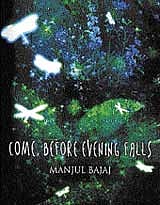
Come, before evening falls
Manjul Bajaj
Hachette, 2009,
pp 238 , Rs 295
Come, Before Evening Falls, Manjul Bajaj’s novel set in 1909 in the Rohtak Division of the erstwhile Punjab province is a story about forbidden love in the Jat community. Woven into the plot is the terrible practice of honour killing. Something which, sadly, exists even today.
The novel starts off slowly, almost languorously as a gentle story of love among the wheat fields. Half way through it picks up pace and moves rapidly on to its climax with a dramatic twist at the very end. The heroine of the novel, Jugni, a soft hearted, beautiful 18-year-old Jat girl falls in love with dashing young Raakha who comes from a neighbouring village to set up a school. Theirs is a doomed love as both of them belong to the same ‘gotra’ and hence cannot get married.
Manjul Bajaj tries to recreate the social backdrop of an era when letters took months to reach and girls never went to school. It is a closed society governed by strict marriage rules and the diktats of the Khap Panchayat.
As they meet secretly and exchange dreams, they know running away is not really an option. It would mean wrenching the orphaned Jugni away her beloved Tau (Uncle), her grandmother and her extended family of cousins. Her family would have to face the social consequences of her errant act. “She did not have it in her to be the things his love asked of her — truant daughter, runaway bride, a blot on her family’s history, a corpse hanging from a tree.”
Raakha urges her to go away with him saying he does not care for values and traditions. “People all over the world get married without even knowing what gotra is,” he says. The khap and gotra rules really mean nothing to Jugni, because “she did not have the wisdom or knowledge” to understand them. But she knows deep inside that “You could not take whatever you wanted, however intensely you might want it, if it meant someone else had to pay the price.”
Ambitious Raakha faces his own dilemma. Because he is the spurned and unwanted son of a wealthy landowner, he wants to prove himself and “become someone.” And for this he has to stay. He has to prove himself by building the school and working on a project to document the history of the Jat community. He cannot really afford to anger Jugni’s powerful Tau who is his employer and benefactor.
Bajaj paints the slowly growing anti-British sentiment into the backdrop. Most of the young men in the Jat villages join the British army. Tau’s son Lena Singh who is in the army writes to his father saying he has decided to defy his superiors in the army and wear the janeu or sacred thread and become a follower of the Arya Samaj.
His agitated father orders him not to to do anything so rash because “the Jats were the most loyal and brave soldiers” of His Majesty’s army. But communication both ways takes long and by the time the letter reaches, Lena had taken the decision to follow his beliefs and no one knows what the consequences were. Would he have been put to death for sedition or was he still alive?
Another Jat tradition which the author interweaves with dramatic effect into her plot is the practice of a widow being married off to another male within the same family. Jugni’s Chachi, a beautiful and seductive woman, marries Tau, her husband’s own widowed elder brother when her husband dies. The machinations of Chachi and the interplay of family politics build up during the course of the novel.
Come, before Evening Falls is a well written novel with a nicely conceived plot. It is easy to read and empathise with. I only wish Bajaj had used finer brush strokes while painting the backdrop. That would have given this story of love and loss a whole new dimension.

